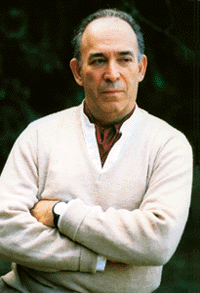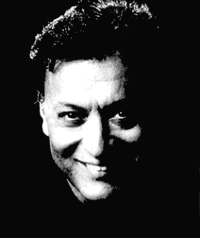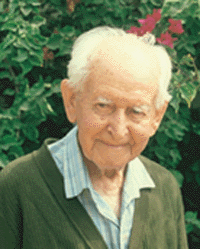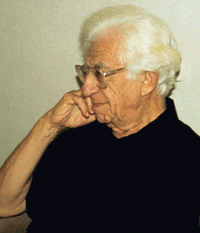Peter Hübner: And the interest in Germany; because it was from the “International Conference on Pre- and Perinatal Medicine“ in Jerusalem that I was invited to the congress in Tübingen, on which I came across the leading hormone researchers of the world. In this respect there is also a direct line from Jerusalem to Germany, but also another line from Jerusalem via the former states of the Soviet Union to Germany.

Noam Sheriff
In a public recommendation
belongs to the most important composers and conductors of Israel.
Born in Tel Aviv in 1935,
he studied composition with
Paul Ben-Haim in Tel Aviv, with
Boris Blacher in Berlin and
Igor Markevitch in Salzburg.
At the age of 22 he became world famous through the premier of his work “Festival Prelude” with Leonard Bernstein and the Israel Philharmonic Orchestra.

‘most busy conductor of the world’, MUSIC DIRECTOR of the ISRAEL PHILHARMONIC ORCHESTRA, ARTISTIC DIRECTOR OF THE ORCHESTRA DEL MAGGIO MUSICALE FLORENTINO
in Florence

renowned violinist and music pedagogue, founder of the
HAIFA SYMPHONY ORCHESTRA,
for 28 years DIRECTOR of the
MUSIC CONSERVATORY of HAIFA – probably the most important music therapist in Israel

CHAIRMAN
INSTITUTE FOR MUSICOLOGY
of the UNIVERSITY TEL AVIV
In a public recommendation
belongs to the most important composers and conductors of Israel.
Born in Tel Aviv in 1935,
he studied composition with
Paul Ben-Haim in Tel Aviv, with
Boris Blacher in Berlin and
Igor Markevitch in Salzburg.
At the age of 22 he became world famous through the premier of his work “Festival Prelude” with Leonard Bernstein and the Israel Philharmonic Orchestra.

ZUBIN MEHTA
writes about Peter Hübner’s project
‘most busy conductor of the world’, MUSIC DIRECTOR of the ISRAEL PHILHARMONIC ORCHESTRA, ARTISTIC DIRECTOR OF THE ORCHESTRA DEL MAGGIO MUSICALE FLORENTINO
in Florence

Prof. Dr. Zvi Rothenberg
judging on Peter Hübner's music
renowned violinist and music pedagogue, founder of the
HAIFA SYMPHONY ORCHESTRA,
for 28 years DIRECTOR of the
MUSIC CONSERVATORY of HAIFA – probably the most important music therapist in Israel

Prof. Dr. Herzl Shmueli
In a letter to Peter Hübner
CHAIRMAN
INSTITUTE FOR MUSICOLOGY
of the UNIVERSITY TEL AVIV
Medical Media Group: Did something else come up in Israel?
Peter Hübner: Yes, a lot. Firstly I met there quite a few leading personalities from the field of classical music, and I think here in particular of the internationally renowned composer and present director of the Rubin-Academy of Music of the University of Tel Aviv, Noam Sheriff, who, as is known, was for a long time also music director and principal conductor of the Israel Symphony Orchestra.
But secondly I also met various conductors – I think here of Zubin Mehta, principal conductor of the Israel Philharmonic and during his career principal conductor and music director of many other great classical orchestras in the whole world like in Los Angeles and New York and at present also in Munich, and I think of Ronly Riklis, conductor of the Jerusalem Symphony Orchestra, and of Stanley Sperber, principal conductor of the Haifa Symphony Orchestra and of the Israel National Choir.
Furthermore I met the famous philosopher Yeshayahu Leibovitz and had a very long, intensive conversation with him, and I met the probably most significant music therapist of Israel, Prof. Dr. Rothenberg, who gave me the most important inspirations, which you can wish to get from an expert for your activity.
Medical Media Group: He spoke about your music at various occasions.
Peter Hübner: But his most important inspiration probably was the very firm, unperturbed advice, to let myself, by no means, be influenced by the scientific method of differentiating by faculties, so usual today, in order to develop then, as a result, special music for the different medical disciplines and diseases – an advice that had been given to me by experts over and over again and about which I had asked him.
He said I should continue to concentrate on nothing else than on the sphere of universality, for this would be the striking unique potential at our disposal with classical music.
This serious and uncompromising word of this important man – he had founded the Haifa Symphony Orchestra and had directed the conservatory of Haifa for 28 years – I have not forgotten until today. And always, when the “highly modern” aspect of differentiation is brought up to me, then thinking of this meeting supports me in my clear “no” to differentiation, or to splitting respectively, and in my inner “yes to universality” and “unity”.
Medical Media Group: Furthermore you met Prof. Shmueli, the director of the musicological department at the University of Tel Aviv.
Peter Hübner: Next to my plan of creating a new music faculty of the future I spoke with him also about that ancient plan of Pythagoras of interconnecting the most diverse fields of knowledge by using the nature-given link of the microcosm of music, where subjectivity and objectivity meet – similarly how we know this, in a limited way, from mathematics.
As a result Prof. Shmueli organized meetings with heads of other faculties of Tel Aviv University, and I met with great resonance there with these considerations, and in further talks we continued looking into this matter.
Medical Media Group: Prof. Sperling, director of the medical faculty, for instance, organized a meeting with medical doctors from the different disciplines of his faculty.
Peter Hübner: After my return to Germany, however, my other activities as well as a whole lot of traveling abroad absorbed me so much, that to this very day I did not find the time to look into this matter any further – but now I want to devote myself to it more intensively again.
Medical Media Group: So Israel played an important role in the development of this new branch of medicine?
Peter Hübner: If you start from the “here” and “now” and disregard the aspect of consciousness, disregard my earlier research into the microcosm of music and, last not least, disregard the works of Pythagoras 2.500 years ago and in consequence, the many economic and technical developments connected to it until today – on which, next to other things, also the development of democracy was bound, in Europe and elsewhere –, then I would say: yes, in Israel the essential practical fundamentals were laid to make this new branch of medicine available internationally.